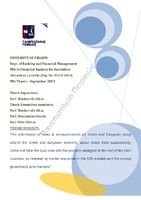The information of news & announcements on Greek and European policy and/or the Greek and European economy, about Greek Debt sustainability, Greek exit from the Euro Area and the possible contagion to the rest of the EMU countries, as revealed by market responses in the CDS markets and the country government bond markets

Προβολή/
Θεματική επικεφαλίδα
Οικονομική κρίση ; Ευρωπαϊκή Ένωση -- Πολιτική και διακυβέρνηση ; Νομισματική πολιτική ; Νομισματική πολιτική -- Ευρωπαϊκή Ένωση, Χώρες τηςΛέξεις κλειδιά
Euro AreaΠερίληψη
Στόχος της παρούσας εργασίας είναι η παρουσίαση στοιχείων και στατιστικών ενδείξεων σχετικά με τον τρόπο και το εύρος της επιρροής που τυχόν άσκησαν στους εταίρους της Ευρωπαϊκής Νομισματικής Ένωσης τα αρνητικά για την βιωσιμότητα του Ελληνικού χρέους γεγονότα και οι εξελίξεις στη μετάδοση της Ελληνικής κρίσης δημοσίου χρέους. Περιγράφεται ο τρόπος με τον οποίον οι σχετικές πληροφορίες εντοπίστηκαν, οργανώθηκαν με βάση τη χρονολογική τους σειρά και κατηγοριοποιήθηκαν ως θετικές η αρνητικές. Χρησιμοποιήθηκε μία μελέτη πολλαπλών γεγονότων (event study) βραχυπρόθεσμου χρονικού ορίζοντα επίπτωσης. Η μελέτη βασίστηκε στην εκτίμηση ελαχίστων τετραγώνων υποδειγμάτων στατιστικής παλινδρόμησης τα οποία καθορίστηκαν για κάθε χώρα με μεταβλητές ελέγχου για εξωγενείς κινδύνους και μεταβλητότητα, με σκοπό την εκτίμηση της ευαισθησίας των Ασφαλίστρων Συμβολαίων Ανταλλαγής Κινδύνου Κρατικής Χρεοκοπίας και των Περιθωρίων Απόδοσης Κρατικών Ομολόγων στην πραγματοποίηση τέτοιου είδους συμβάντων, κατά τη διάρκεια διαφορετικών υποπεριόδων μιας ευρύτερης 3ετούς περιόδου με ημερομηνία έναρξης τον Σεπτέμβριο του 2009. Τα αρνητικά αυτά γεγονότα αναπαριστώνται με μια εκφυλισμένη διακριτή δυαδική μεταβλητή, της οποίας αναλύεται η στατιστική σημαντικότητα και ισχύς (συντελεστής παλινδρόμησης). Τα αποτελέσματα υποδηλώνουν ότι η μεταβλητότητα των Ασφαλίστρων 5ετών Συμβολαίων Ανταλλαγής Κινδύνου Κρατικής Χρεοκοπίας και των Περιθωρίων των 10ετών Κρατικών Ομολόγων, αποδίδεται σε αρνητικά γεγονότα σχετιζόμενα με το Ελληνικό Δημόσιο χρέος, με τρόπο συνεπή και όχι αμελητέο, κατά τη διάρκεια σημαντικών και διαφορετικών χρονικών περιόδων. Η αγορά των Ασφαλίστρων Συμβολαίων Ανταλλαγής Κινδύνων Κρατικής Χρεοκοπίας, φαίνεται να ενσωματώνει την πληροφορία των εν λόγω συμβάντων πιο πριν από ότι η αγορά Κρατικού χρέους ενώ οι χώρες του πυρήνα της Ευρωπαϊκής Νομισματικής Ένωσης, είναι πιο ευαίσθητες σε αυτά μετά το μέσο της συνολικής περιόδου ανάλυσης της εργασίας αυτής, σε σχέση με τα κράτη της λεγόμενης «περιφέρειας».


